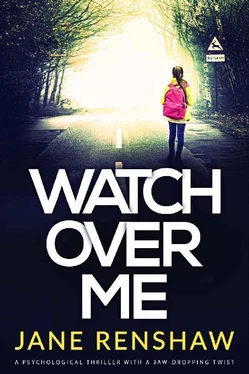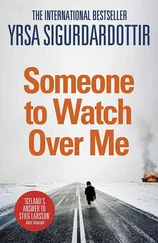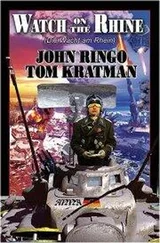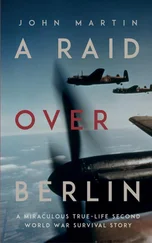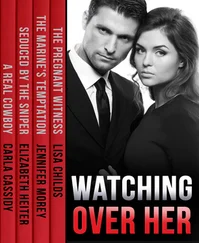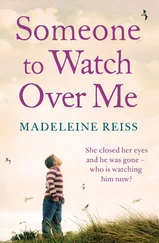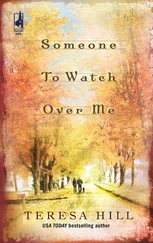Hands shaking, Flora knelt to push the hair off Saskia’s face, to feel for a pulse at her neck.
No pulse.
She felt warm to the touch, but that could be because Flora was, suddenly, so freezing cold herself. Was she still warm?
‘Saskia,’ she said again, stupidly.
Vital signs.
She’d been a nurse, for God’s sake.
Vital signs.
She found her sunglasses in her bag and held them, shaking, under Saskia’s nose, peering at the dark surface for signs of condensation.
Nothing.
Shoving the sunglasses back in her bag and fumbling for her phone, she turned on the flashlight app. Her hand steady now, she lifted Saskia’s right eyelid. The eye under it was rolled back slightly, as if already turned to heaven. She shone the light into the eye.
No constriction of the pupil.
She lifted one of Saskia’s arms – surprisingly heavy for such a thin person – and shone the flashlight onto the skin under the forearm. It was reddened in mottled patches.
The first, definitive signs of lividity.
So no CPR.
She must have been dead for at least half an hour.
And then all Flora could do was kneel there as Saskia’s blood soaked from the carpet into the knees of her jeans. The source of the blood, the nurse’s part of her brain noted, was Saskia’s chest – the front of the green T-shirt she was wearing was one huge dark purple stain.
Saskia Mair had been stabbed to death.
She needed to call the police.
She tapped 999 on her phone and then stopped.
She couldn’t.
If she called the police, she would be scrutinised as a possible suspect. They would dig into her past. They might find out that Ruth Innes died at the age of six and was reborn as a teenager in 1983. They might find out about Rachel.
No one had seen her come in here.
She needed to just go.
She could find a phone box, disguise her voice, tell the police she was a concerned neighbour who didn’t want to give her name, but there had been yobs hanging about the stair and she thought they might have got into Saskia’s flat.
Or she could just go.
She dropped her phone back in her bag and stood.
‘Sorry,’ she mouthed to Saskia.
The knees of her jeans were sticky with blood. But they were dark navy denim and it wasn’t too noticeable. She was parked just round the corner. All she had to do was get to her car without attracting attention.
But the police would be asking people about anyone they’d seen. There might even be CCTV in the street.
There were four doors off the tiny hall. The second one she tried was a cupboard, with some coats hanging up and others in a pile on top of various boxes. She found a raincoat which was way too small but which, tied round her waist by the sleeves, flapped over her knees and concealed the bloodstains.
Now she needed something to hide her face.
A hat?
She couldn’t see one.
She opened another door – a bathroom, smelling of mould and uncleaned toilet, a grey tidemark all round the bath. And another – a chaotic bedroom – clothes all over the bed and floor, a furring of dust on the cheap pine dressing table.
She had her hand on the wardrobe when she realised: fingerprints. DNA.
She grabbed a dirty pink T-shirt from the floor and used it to wipe the door of the wardrobe, then the door handles in the hall. Had she touched anything else? Had she touched Saskia? Would her DNA be on Saskia’s body?
She thought she had maybe touched her face.
Her neck, definitely, when she was feeling for a pulse.
Then, she had touched her with the tenderness of one human confronted by another who’d been hurt, who needed help. Now, it was like being a butcher prepping a slab of meat as she wiped the T-shirt flinchingly across Saskia’s dead forehead, cheeks and neck.
Then she returned to the wardrobe and used the T-shirt to open it.
No hats.
There were a couple of hoodies badly folded on a shelf, one of which, a pale grey one, looked roomy enough to fit her. She grabbed it, wriggled it on over her top and pulled up the hood, feeling the need to hide her face immediately. It smelt of sweat and sickly deodorant. Her throat contracted and she gagged.
She folded her arms, hands tucked away so she wouldn’t accidentally touch anything else, and stepped carefully from the bedroom to the hall – she didn’t look down again – and to the front door of the flat. It was still standing slightly open.
She stopped just inside it and listened, but there were no sounds coming from the stairwell. Quickly, before she lost her nerve, she stepped onto the stone landing and, tugging the sleeve of the hoodie over her hand, pulled the door almost shut.
Her mouth dry, her pulse thumping in her ears, she made herself walk, not run, down the stone steps, onto the landing below, past the two doors there, onto the next flight of steps, the raincoat flapping against her legs.
On the next landing down she could hear voices behind one of the doors, the scruffy black one. What if the door suddenly opened and they saw her?
Grabbing the bannister, she flung herself round the curve of the stairwell and down two steps at once – and jolted to a halt.
Idiot!
She’d touched the bannister with her bare hand.
She pulled the thin wool of the hoodie’s sleeve over her hand and ran it back up the bannister to where she’d grabbed it. She was going to be sick. Sour bile was rising at the back of her throat again –
If she was sick, could they get DNA from it?
Swallowing and gasping, she somehow made it down the last flight of stairs to the dingy passage that led to the main door.
Her footsteps clopped along it, echoing up the stair as she heard a voice on the landing above; a harsh laugh.
She ran.
Pulling the sleeve back over her hand, she wrenched open the heavy door and ran out into the air, up the narrow close to the street, to the litter and the traffic and the run-down shopfronts and the people walking by – an old woman’s sharp little eyes on her –
She stopped running – slowed to a normal pace, her legs almost buckling under her, as if they’d forgotten how to do it, how to move normally.
She looked down at her feet as they moved, one past the other, at the grubby pavement with its pockmarks of chewing gum, its fag ends and its broken paving. It had been raining, and where the slabs had sunk and cracked, dirty brown puddles had formed in random geometric shapes. Even the puddles here had hard edges. The pavement had a sheen on it, and her right foot came down on a disintegrating scratch card stuck to its surface.
All around her was the sound of people, potential witnesses – so many cars swishing past, so many bodies passing by, looking at her, probably, this strange woman in the hoodie walking with her head down.
But it had been raining, so maybe that was okay.
She risked a glance up to get her bearings. There was the newsagent on the corner with dusty windows behind metal grilles, a stark contrast to the aggressively smiling, doll-like celebrity couple on the sandwich board outside.
She waited for a break in the traffic, hood pulled well over her face, and when it came she ran across the road, ran up the side street where she’d left her car.
The tears came, for some reason, as soon as she caught a glimpse of red behind the broad rear of a silver four-by-four. Her little red Ka. For some reason, it was at this moment that she was no longer able to hold back the image of Saskia’s little boy in his mother’s arms, the arms that had held him as no one else ever would again.
I just wanted to see you .
Fumbling the key from her pocket, she pointed and pressed the rubbery button and the car winked its lights at her and she hauled open the door and dived inside.
Читать дальше
